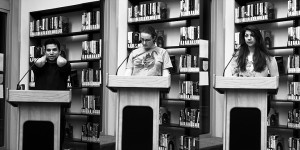Wednesday night at Burling last week was a tribute to the dedication three seniors have to their crafts—prose and poetry. Mario Macias ’11, Kelly Musselman ’11 and Jessie Rippel ’11 presented their work to a dozen students and a handful of Grinnell faculty. Though their styles were remarkably different and their backgrounds varied, the common theme was a sense of nostalgia for their four years of intellectual and creative growth as well as a rueful optimism as they look towards the future.

“It’s really nice to see each other grow after four years,” Rippel said, “because we all started out here writing, and we’ve seen each other’s style change, our influences change.”
Mario Macias read his poetry first, braving the silent audience simply because the three students had elected to go in alphabetical order. After a brief plug for his “baby,” GoGo—the campus erotica magazine—as well as one for the Grinnell Review, for which he serves as an editor, Macias launched into poetry. His work spanned the past four years of self-discovery, using both Spanish and English to convey everything from a first-year crush to a fantastical epigraph to Dali. His light banter between poems expressed the anxiety of reading personal thoughts aloud, but it also reflected the witty observations that composed a thread through all of his poetry.
“Mario writes a lot about people and conversations with people,” Musselman said.
His commentary on the atmosphere of Madrid, Spain displayed his ability to capture the nature of human interaction at a very basic level, reducing every habit or action to something remarkably elemental.
“Mario’s pretty edgy,” Rippel said. “He’s a little more pop-referential than I am, I would say.”
Rippel’s comment is easily supported by Macias’ poem about his Latin-American heritage, wherein he wishes his brother could play with Michael Jordan like in “Space Jam.”
Overall, Macias provided a humorous and edgy introduction to the evening’s display of student talent.
Kelly Musselman followed Macias’ poetry with her own poetry as well as a non-fiction piece she is working on in her Craft of Non-Fiction class with Professor Savarese. The contrast was astonishing as this future English teacher and writer used her experiences in the deserts of the western United States to address the human experience, even the divorce of her parents.
“Kelly’s very lyrical, and very nature-based in her poetry,” Rippel said.
Her autobiographical story about searching for pictographs with her mother on Christmas Day was a beautiful introduction to this lyrical style. Although the narrative jumped from the simple journey back to treasured and dreaded memories of her father, creating a complicated path with which to follow the thread of the tale, it was simple to feel her emotions as she escaped into the sparse wilderness. Musselman left the desert for one short poem, an epigraph to Emily Dickinson, but it was clear that she was most comfortable in the natural world.
Rippel was the last to read, and her slight nervousness did little to affect the visceral impact of her emotionally-charged poetry. Beginning with a poem that addressed the first communion on the moon, Rippel introduced the audience to her style before truly delving into the personal subject matter of the rest of her work. A heartrending description of a family death, an erotic love poem about a Grinnell crush, and a humorous ode to food and family encompassed the subject matter of what she calls her “edgy-ish” poetry. She has very specific interests, one of which may surprise those who depend upon the staid reliability of poetic themes.
“I like to write about food, a lot, actually,” Rippel said. “I mean, like, the main topics in poetry, if you really want to generalize, are sex, death and food, for me, is the third.”
Despite the varying subject matter, styles, and personalities, it is clear that these three seniors share a tremendous bond over the writing they have done at Grinnell.
“I can talk about their stuff better than my own,” Rippel said.
Musselman also expressed how much easier it was to discuss her classmates’ work, citing years of class readings as the reason for why all three seniors are finding their impending separation from Grinnell and each other to be bittersweet.
“I just don’t know who will workshop my stuff,” Musselman said.
The writers hope that readings like this will bring the Grinnell writing community together, so that other students can experience the same type of support that they have had throughout their four years here.
























































